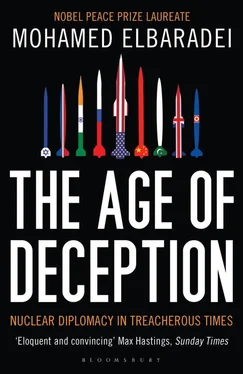On the other hand, the Security Council imposed sanctions on Iraq in 1990 that led to egregious violations of human rights for millions of Iraqi civilians and culminated in a war in 2003 without the council’s consent. To add insult to injury, the council continued to maintain certain sanctions against Iraq for years after the 2003 invasion, long after it was clear to everyone that Iraq had no WMD. The council was unable to agree on how to terminate the UNMOVIC and IAEA mandates in Iraq and close the WMD file. And burdened by the ravages of a war that should never have occurred, Iraq was forced to finance UNMOVIC for more than four years while it sat idle in New York.
While the P-5 exacerbated nuclear insecurity through their actions in the Security Council, their own failure to disarm contributed directly to proliferation itself. Yet the P-5, and the United States in particular, refused to acknowledge the linkage between their lack of progress on disarmament and the growing volume of proliferation-related concerns.
In April 2004 a joint proposal was submitted to the U.S. Congress by the secretaries of state, energy, and defense, to develop “small” nuclear weapons. Their argument was essentially that these weapons would be perceived as more readily usable. If enemy countries believed that the United States might actually use these mini-nukes, the deterrent effect would be stronger. It did not seem to occur to them that the idea of a “more usable” nuclear weapon ran directly contrary to the tenets of the NPT regime and would only tempt more countries to acquire such weapons to defend themselves.
The United States also continued to develop its missile defense shield, which both Russia and China regarded as a threat. The United States claimed that the shield was intended to protect them against missiles by “rogue states,” meaning North Korea and Iran. Many experts pointed out that this argument did not make sense. An attack by a small country—or, for that matter, by a group of terrorists—would more likely come in the form of a crude bomb smuggled in through a harbor or across a border, and not through a missile with the country’s name on it. The missile shield would be pointless.
I frequently spoke out on these issues, in speeches and press interviews, and the Americans just as frequently complained that I was over-stepping the limits of my position, speaking “out of the box.” I told them I had “no box,” that I felt it part of my responsibility to speak out on matters that had a direct impact on the nuclear nonproliferation regime, a responsibility that, as a Nobel laureate, I felt even more keenly. When it came to reporting on verification issues, my role was to present the facts. But I had witnessed the discrediting and manipulation of the IAEA’s work in the lead-up to the Iraq War and would not allow that to happen again on my watch. I felt it was important to leave as little room as possible for media hype or manipulation. And it was my charge to help Member States find peaceful solutions to nuclear tensions, by contributing my perspective and vigorously supporting nuclear diplomacy. I knew, of course, that the states themselves made the decisions in the end.
In early 2007 the British government announced its decision to upgrade its nuclear deterrence force by building new Trident nuclear ballistic missile submarines, a move effectively designed to extend the British nuclear deterrent to mid-century. I was amazed by the hypocrisy. In an interview with the Financial Times about Iran’s nuclear cycle development, [16] “Iran Nears Industrial Nuclear Fuel Production,” February 19, 2007.
I said that as long as the United Kingdom and other such states continued to modernize their weapons, I would find it very difficult to tell other countries that nuclear deterrence was not good for them.
The Telegraph reported my comments under the title “UN Nuclear Watchdog Calls Trident Hypocritical.” John Sawers, then the director general for political affairs at the Foreign Office, [17] Sawers was later appointed head of MI6, the British secret intelligence service.
called to say that my remarks had gone down very badly in London. He expounded on how the British had reduced their nuclear force; it was the smallest arsenal among the P-5, and he felt I was picking on them.
“Don’t you understand,” I asked him, “that it is difficult to argue that some countries should continue to have nuclear weapons and modernize them while others are told they cannot?”
“Yes,” Sawers replied, “but we should not be compared with Iran.”
The issue was not Iran but the general principle. The United Kingdom seemed to be invoking an odd moral calculus: “We’re the good guys; they’re the bad guys; trust us.”
In the House of Commons, Blair was asked about my Financial Times interview. “The United Kingdom,” he replied, “has the right under the NPT to have nuclear weapons, and as Mohamed ElBaradei is the custodian of that treaty’s implementation, it would be a good idea for him to act accordingly.” [18] Rebecca Johnson, who had served as an adviser to UNMOVIC, wrote a detailed rebuttal to Blair in the Bulletin of the Atomic Scientists , which ended by saying that he owed me an apology. Rebecca Johnson, “Tony Blair’s Forgetfulness,” Bulletin of the Atomic Scientists, February 26, 2007.
His rendering of the treaty was a revealing distortion but symptomatic of the behavior of the nuclear-weapon states, who fulfilled their obligations to disarm through lip service only.
It was especially distressing to note that only South Africa publicly protested the United Kingdom’s Trident decision. The non-nuclear-weapon states responded with deafening silence, a dismaying response that signaled to me their resignation in the face of a world order that had acquired the appearance of inevitable permanence.
I was reminded of this less than a year later, in a meeting with British foreign secretary David Miliband. We had been talking about Iran; Miliband acknowledged the complexity of the issue, but it was obvious that we did not see eye to eye. At one point he exclaimed, “Why do you think Iran wants to have nuclear weapons?”
“Why does the United Kingdom have nukes?” I was tempted to retort. I found the double standard astounding, but I kept silent.
The IAEA faced many challenges in carrying out its mandate. We were strained for resources. We had insufficient authority. We were spied on by the same intelligence agencies we relied upon to inform us when they detected nuclear anomalies; we were given selective intelligence information, which was often difficult to authenticate. We were dependent on Member States, some of whom had their own agendas, to supply us with state-of-the-art technology we could not afford. We were pressured by those who believed that funding the Agency came with the right to influence its work for political ends. [19] For example, during a meeting at my home with Nicholas Burns, U.S. undersecretary of state for political affairs, and some of his colleagues, he handed me a paper detailing what the U.S. expected from the Agency in handling Iran’s nuclear file. Naturally, I was displeased, but I merely put the paper to one side, saying calmly, “We know what to do about Iran.” Burns’s retort was pointed: “You know,” he said, “that we pay 25 percent of your budget.”
And we continued to face complex nuclear verification cases that challenged our resourcefulness and our patience.
But the great, unspoken travesty was that nuclear weapons continued to exist at all, much less that the most powerful countries on the planet held on to their arsenals like a security blanket. We repeatedly heard dire predictions about Iran developing a single nuclear weapon when the world was already blighted by the existence of more than twenty-three thousand such weapons. Many of those weapons were on “hair-trigger” alert—meaning that the leaders of the United States and Russia, faced with the possible launch of a nuclear missile that might well have been caused by computer error or unauthorized use, would have only half an hour to decide whether to retaliate, risking the devastation of entire nations in a matter of minutes. Yet political leaders continued to declare that all this was irrelevant to proliferation.
Читать дальше












